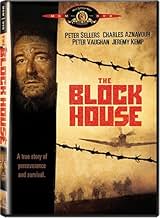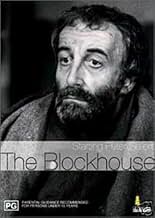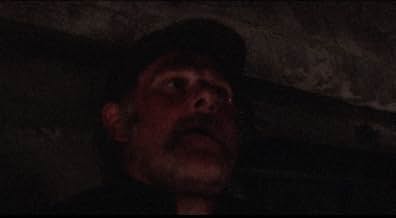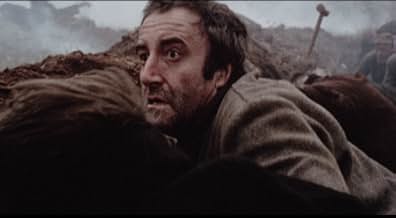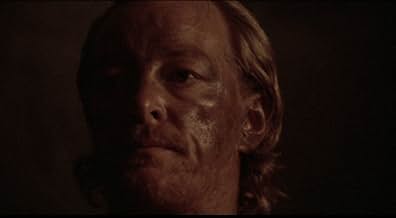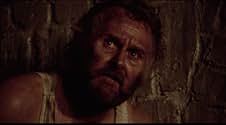During D-day several people become trapped while hiding in a bunker, when heavy shelling collapses it. They have plenty of food and water so they decide to wait for rescuers. And so they wai... Read allDuring D-day several people become trapped while hiding in a bunker, when heavy shelling collapses it. They have plenty of food and water so they decide to wait for rescuers. And so they wait year, after year, after year.During D-day several people become trapped while hiding in a bunker, when heavy shelling collapses it. They have plenty of food and water so they decide to wait for rescuers. And so they wait year, after year, after year.
- Awards
- 1 nomination total
Featured reviews
All the actors in this film do a fine job. But honestly, I can't see why other reviewers are going ape over Peter Sellers - are they just surprised that he could be serious? The man was a good actor, not just a clown. But in this film, we don't really know his character - he's just one of seven sorry souls trapped underground in a large storeroom after an Allied raid on the camp where they were held prisoner.
The film has an interesting premise, but trying to cram six years of action into 90 minutes is beyond the ability of the director and writers. It becomes very episodic, starting with a decent amount of set-up, followed by what more or less amounts to a series of death scenes. The story is certainly tragic, but it feels like Cliff's Notes on celluloid. I'm going to try to find the book.
This was probably Stanley Myers's easiest film to score, since it only called for an opening and closing bit with only a couple of instruments. The lack of music throughout underscores the claustrophobic atmosphere of the "dungeon." The sound and picture quality of the DVD available from Netflix (in 2010) leave much to be desired. If you enjoy dark, depressing, hopeless stories, this should be in your top ten.
The film has an interesting premise, but trying to cram six years of action into 90 minutes is beyond the ability of the director and writers. It becomes very episodic, starting with a decent amount of set-up, followed by what more or less amounts to a series of death scenes. The story is certainly tragic, but it feels like Cliff's Notes on celluloid. I'm going to try to find the book.
This was probably Stanley Myers's easiest film to score, since it only called for an opening and closing bit with only a couple of instruments. The lack of music throughout underscores the claustrophobic atmosphere of the "dungeon." The sound and picture quality of the DVD available from Netflix (in 2010) leave much to be desired. If you enjoy dark, depressing, hopeless stories, this should be in your top ten.
10carver76
I consider myself as big a Peter Sellers fan as there is in the world, but this one film had eluded me for years until now...It is one of my favorite of Sellers' performances, and is a very powerful film overall. Highly recommended!
A film that seems intended to drive its audience to mass suicide, "The Blockhouse" is more likely to inspire tedium and finally relief when it limps to its unsatisfying conclusion.
The film features seven slave laborers in World War II France who find themselves trapped deep in an underground chamber when their German position is bombed and shelled in preparation for D-Day. There is no escape for these men; they must bide their time eating and drinking from the ample provisions left by the German Army, do their best not to get on each other's nerves, and hope for a miracle.
The film stars Peter Sellers, though he is only a first among equals here and certainly not to be watched for his comic prowess. Playing a teacher named Rouquet, he has a light moment trying to teach dominos to the others, but for the most part stares bleakly at the walls as a heavy beard grows on his face. Sellers is completely convincing in his part, but it is less a character than a construct. Rouquet is the voice of hope whose point in the story is being stilled.
The other main character, and the only one that catches your notice, is Jeremy Kemp's Grabinski, a rational man who realizes before anyone else the hopelessness of the situation but who tries to make things bearable for his comrades. His exchanges with Rouquet playing games reflects the hope/no hope dichotomy.
"I think you'll lose," Grabinski tells Roquet during the dominos demonstration.
"How can you possibly tell I'll lose when I'm teaching you this game?" Roquet replies.
"Never mind," Grabinski shrugs.
The whole movie is like that, unconnected vignettes between the trapped men that strive at some greater purpose without advancing anything resembling a plot. Director/co-writer Clive Rees seems to be trying to go for a Pinder or Beckett thing with the sparse dialogue and hopeless situation. But too much bleakness keeps us distant from the characters and their situation.
As calamities pile up, like the suicide of one of the men and the arrival of winter, it's all you can do to register their pain. You don't have any sense of who these people might be, however good a job Kemp, Sellers, and the other actors do. And they do good work all around, including the legendary French singer Charles Aznavour as a tough scrapper named Visconti and Swedish notable Per Oscarsson as the brooding Lund. With their beards and grimy faces, and their believable, seemingly improvised acting, they pull you into their horrible situation easily enough. But the film lets them down in terms of having anything more to say than life is hell.
Don't be fooled by the 90-minute running time: This is a long movie to sit through, tough to follow with choppy editing that seems to kill off one character twice while two others disappear without explanation. Characters say little to one another, and when they do speak it is often pitched so low one can barely hear it. The visual design leans heavily on the dark surroundings to the point where the only print available today screens like an oil spill.
This is a movie I wouldn't watch once if it wasn't for Sellers, and can't recommend even to his fans. If you like bleak movies, you may feel otherwise, but whatever your mindset I doubt you will have any more success figuring out what is happening than I did.
The film features seven slave laborers in World War II France who find themselves trapped deep in an underground chamber when their German position is bombed and shelled in preparation for D-Day. There is no escape for these men; they must bide their time eating and drinking from the ample provisions left by the German Army, do their best not to get on each other's nerves, and hope for a miracle.
The film stars Peter Sellers, though he is only a first among equals here and certainly not to be watched for his comic prowess. Playing a teacher named Rouquet, he has a light moment trying to teach dominos to the others, but for the most part stares bleakly at the walls as a heavy beard grows on his face. Sellers is completely convincing in his part, but it is less a character than a construct. Rouquet is the voice of hope whose point in the story is being stilled.
The other main character, and the only one that catches your notice, is Jeremy Kemp's Grabinski, a rational man who realizes before anyone else the hopelessness of the situation but who tries to make things bearable for his comrades. His exchanges with Rouquet playing games reflects the hope/no hope dichotomy.
"I think you'll lose," Grabinski tells Roquet during the dominos demonstration.
"How can you possibly tell I'll lose when I'm teaching you this game?" Roquet replies.
"Never mind," Grabinski shrugs.
The whole movie is like that, unconnected vignettes between the trapped men that strive at some greater purpose without advancing anything resembling a plot. Director/co-writer Clive Rees seems to be trying to go for a Pinder or Beckett thing with the sparse dialogue and hopeless situation. But too much bleakness keeps us distant from the characters and their situation.
As calamities pile up, like the suicide of one of the men and the arrival of winter, it's all you can do to register their pain. You don't have any sense of who these people might be, however good a job Kemp, Sellers, and the other actors do. And they do good work all around, including the legendary French singer Charles Aznavour as a tough scrapper named Visconti and Swedish notable Per Oscarsson as the brooding Lund. With their beards and grimy faces, and their believable, seemingly improvised acting, they pull you into their horrible situation easily enough. But the film lets them down in terms of having anything more to say than life is hell.
Don't be fooled by the 90-minute running time: This is a long movie to sit through, tough to follow with choppy editing that seems to kill off one character twice while two others disappear without explanation. Characters say little to one another, and when they do speak it is often pitched so low one can barely hear it. The visual design leans heavily on the dark surroundings to the point where the only print available today screens like an oil spill.
This is a movie I wouldn't watch once if it wasn't for Sellers, and can't recommend even to his fans. If you like bleak movies, you may feel otherwise, but whatever your mindset I doubt you will have any more success figuring out what is happening than I did.
The makers seem to have forgotten why films ate called movies - because the pivtures move.
They have scored an own goal by locking their internal cast in the dark underground for an hour and a half. It is simply unwatchable. To make matters even worse if that were possible they have underlit it that's turning the whole thing into an ordeal for anyone who decides to watch this film. We needed I was a bit more at the front of the pool to tell us what these people are going through, much less time spent underground simply not interesting. And we should have the scene when they're just covered. As it is it seems that the directors don't want to tell us the story. What's the best will in the world I found it very very difficult to watch and I have to admit that I spun forward after the first 45 minutes at double speed at least to the end of this film.
They have scored an own goal by locking their internal cast in the dark underground for an hour and a half. It is simply unwatchable. To make matters even worse if that were possible they have underlit it that's turning the whole thing into an ordeal for anyone who decides to watch this film. We needed I was a bit more at the front of the pool to tell us what these people are going through, much less time spent underground simply not interesting. And we should have the scene when they're just covered. As it is it seems that the directors don't want to tell us the story. What's the best will in the world I found it very very difficult to watch and I have to admit that I spun forward after the first 45 minutes at double speed at least to the end of this film.
This extraordinary curiosity unearthed by Talking Pictures is a definite exception to the detritus of Peter Sellars' output of the early seventies, free from his usual sin of caring only about his own role at the expense of the overall production.
The passage of time charted by the growth of his beard, Sellars' performance is easily the equal of his Chauncey Gardener in 'Being There' (although his French accent remains rather goonish). Jeremy Kemp as usual is excellent.
Reminiscent of a play by Sartre, the cast have plenty to eat and drink - as one of them observes "All I need is a woman!" - but sorely short of fresh air and decent lighting, the confinement eventually driving them all off their rockers as one by one they succumb to cabin fever.
The passage of time charted by the growth of his beard, Sellars' performance is easily the equal of his Chauncey Gardener in 'Being There' (although his French accent remains rather goonish). Jeremy Kemp as usual is excellent.
Reminiscent of a play by Sartre, the cast have plenty to eat and drink - as one of them observes "All I need is a woman!" - but sorely short of fresh air and decent lighting, the confinement eventually driving them all off their rockers as one by one they succumb to cabin fever.
Did you know
- TriviaThis film is loosely based on actual events, though they happened to German soldiers, instead of Allied soldiers.
- ConnectionsEdited from Zone-Est interdite (1958)
- How long is The Blockhouse?Powered by Alexa
Details
- Release date
- Country of origin
- Language
- Also known as
- The Blockhouse
- Filming locations
- Guernsey, Channel Islands(made entirely on location in)
- Production companies
- See more company credits at IMDbPro
- Runtime1 hour 33 minutes
- Sound mix
- Aspect ratio
- 1.85 : 1
Contribute to this page
Suggest an edit or add missing content



